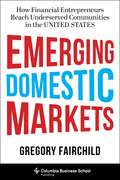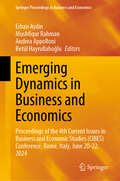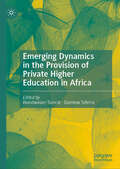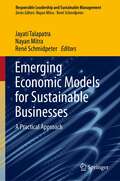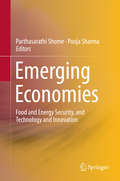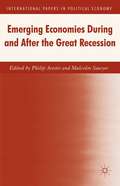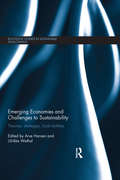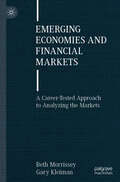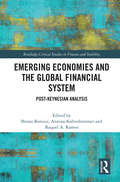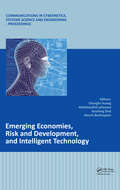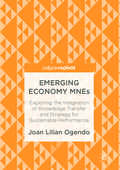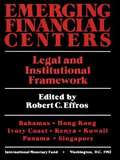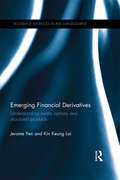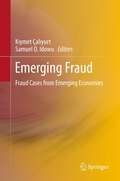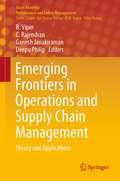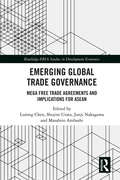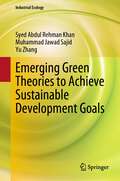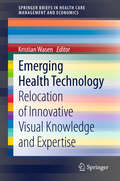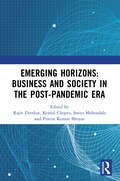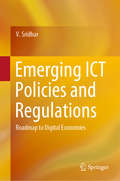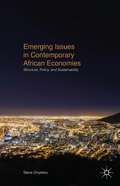- Table View
- List View
Emerging Domestic Markets: How Financial Entrepreneurs Reach Underserved Communities in the United States
by Gregory FairchildThe term “emerging market” refers to a country where incomes are currently low but that is likely to experience rapid growth and increasing economic competitiveness. Identifying emerging markets is important for international development, and for investors they represent intriguing opportunities to reap uncommon gains. Yet many of the characteristics of emerging markets—including demographic shifts, rising educational attainment, and growing urbanization—are also found closer to home, in communities that have been underserved by the existing financial-services system.Gregory Fairchild introduces readers to the rising set of entrepreneurs whose efforts to reach marginalized groups are reshaping the emerging markets of the United States. He explores how minority-owned and community-development institutions are achieving innovations in consumer- and small-business-targeted financial services to further economic development and reduce inequality. Fairchild illustrates these transformative models through compelling narratives: the decision by a Chinese-ethnic credit union to open a branch in a new neighborhood, investment by a minority-led private equity firm in satellite radio for the developing world, and efforts by a community-development-loan fund to bring fresh foods into a food desert in Philadelphia. He analyzes the models of these organizations, measures their successes and failures, and provides suggestions for sustainable growth of similar organizations. Bringing together quantitative research, powerful stories of real-world entrepreneurs, and nuanced insights on public policy, Emerging Domestic Markets offers a vital set of prescriptions for inclusive financial development.
Emerging Dynamics in Business and Economics: Proceedings of the 4th Current Issues in Business and Economic Studies (CIBES) Conference, Rome, Italy, June 20-22, 2024 (Springer Proceedings in Business and Economics)
by Mushfiqur Rahman Andrea Appolloni Erhan Aydin Betül HayrullahoğluThis volume features a collection of selected papers presented at the 4th Current Issues in Business and Economic Studies (CIBES) Conference, held in Frascati (Rome) from June 20-22, 2024. The CIBES Conference offers global perspectives on business and economic research, incorporating analysis at the micro-individual, meso-organizational, and macro-national levels. This book provides a comprehensive overview of contemporary research topics such as sustainable business practices, the impact of digital transformation on global markets, the dynamics of global trade, the future of work, the economic effects of global health challenges, innovation in entrepreneurship, and issues of equality, diversity, and inclusion. Additionally, it proposes frameworks and recommendations to assist organizations and researchers in addressing and managing the complexities of the global business and economic environment effectively. Through this lens, the book seeks to contribute valuable insights and methodologies to the fields of business and economics, serving as a vital resource for academics, practitioners, and policymakers engaged in understanding and navigating the intricate landscape of global business and economic challenges.
Emerging Dynamics in the Provision of Private Higher Education in Africa
by Damtew Teferra Wondwosen TamratThis edited book examines the private higher education (PHE) sector in African countries. Reports suggest that private institutions across the continent outnumber their public counterparts, yet there has been little scholarly investigation into this emerging phenomenon. The book therefore seeks to document, map and analyse key trends and contemporary themes in the PHE sector, as well as chart historical developments, policy and regulatory frameworks. As a whole, it provides the reader with in-depth knowledge, rich perspectives and robust analyses from leading authorities in the field. Contributions from all sub-regions combine thematic issues with shaping discourse on the topic, and the discussions are undertaken in the context of global perspectives. The book will be of interest to academics, researchers, postgraduate students, policy makers, analysts and development partners interested in African higher education and PHE in particular.
Emerging Economic Models for Sustainable Businesses: A Practical Approach (Responsible Leadership and Sustainable Management)
by René Schmidpeter Nayan Mitra Jayati TalapatraThe book discusses new and emerging economic models, that respond to 'Pulling' and 'Pushing' forces. Today we are poised at an interesting juncture, with favourable conditions making it easier to be a sustainable organization acting as a ‘Pulling’ Force and the climate crisis, rise in social-economic equities thereby ‘Pushing’ for urgent action. The book analyses economic models that look at value propositions, creation and capture with ‘People, Planet and Profit’ deeply embedded in each stage of the value chain. The contributions bring out the interplay between new standards, evaluation frameworks, technology innovation and other emerging tools to show how they create a sustainable business. For this, they lean on learnings from successful sustainable businesses. Business leaders will find that this book provides deep insights on improving their existing sustainable practices, and speeding up the transition from linear to circular, narrow stakeholder driven to community driven. For prospective entrepreneurs the book provides the nudge needed to start up a sustainable enterprise. Students and researchers can benefit from real-life examples of how sustainable transformations unfold.The book thus creates an easy guide for those willing to make the transition to sustainability, start a sustainable business and most of all, to motivate those who may not yet be convinced about the long-term sense of taking care of our people and our earth.
Emerging Economies
by Parthasarathi Shome Pooja SharmaThis volume brings together research on development in three major areas of contemporary global relevance: agriculture and food security, energy, and the institutions of national innovation. Covering six of the largest emerging and developing economies (EDEs) in the world, three Asian (China, India and Malaysia), two Latin American (Brazil and Mexico), and one African (South Africa), the book offers insights on how the major EDEs have addressed the complex and increasingly interrelated issues of agricultural growth, food security and access to energy as part of their growth and development experience over the last three decades. Underscoring the broader view of institutions of national innovation capacities, the volume presents the role of domestic policy and macroeconomic fluctuations in shaping the innovation capacities and development policy in these countries. The book is divided into three main parts. Part I addresses agriculture and food security, while Part II focuses on the energy sector, including the importance of clean energy and energy efficiency in improving access. Parts I and II also cover the role of the major sector-specific innovations for increasing productivity and growth. Subsequently, Part III examines the importance of economy-wide institutions of innovation in the context of supporting growth and development.
Emerging Economies During and After the Great Recession (International Papers In Political Economy Ser.)
by Philip Arestis Malcolm SawyerThe International Papers in Political Economy (IPPE) series explores the latest developments in political economy. This twelfth volume presents a collection of eight papers, analysing the emergence and economic problems of the emerging economies during and after the international financial crisis of 2007–8 and the subsequent Great Recession. The contributions range from an analysis of the international financial crisis of 2007–8 in general terms to an analysis of the same but concentrating on the emerging economies, before turning to groups of economies, Arab, African and Eastern European countries, and two relevant but individual countries, namely China and Turkey. This book offers students, scholars, researchers and policy-makers detailed analysis and informed commentary on the origins of the international financial crisis of 2007–8 and the great recession by focusing on its effect on emerging countries.
Emerging Economies and Challenges to Sustainability: Theories, strategies, local realities (Routledge Studies in Sustainable Development)
by Arve Hansen Ulrikke WethalThe rise of emerging economies represents a challenge to traditional global power balances and raises the question of how we can combine sustainability with continued economic growth. Understanding this global shift and its impact on the environment is the paramount contemporary challenge for development-oriented researchers and policy makers alike. This book breaks new ground by combining scholarship on the role of emerging economies with research on sustainable development. The book investigates how the development strategies of emerging economies challenge traditional development theory and sustainability discourses. With regional introductions and original case studies from South Asia, East Asia, Latin America and Sub-Saharan Africa, it discusses how to conceptualise sustainable development in the global race for economic prosperity. What characterises the development strategies of emerging economies, and what challenges are these posing for global sustainable development? How can emerging economies shed light on the global challenges, dilemmas and paradoxes of the relationship between socio-economic improvements and environmental degradation? This book will be a valuable resource for researchers and postgraduates in development studies, geography, economics and environmental studies.
Emerging Economies and Financial Markets: A Career-Tested Approach to Analyzing the Markets
by Gary Kleiman Beth MorrisseyThis first of its kind reference provides insights into the intricacies of assessing vulnerabilities of today's emerging markets. Qualitative and quantitative elements common in public, multinational, and private sector decision-making are explored, as are the range of public and private sector participants including the IMF/World Bank, banks, insurance companies, and mutual and pension funds. Stock, bond, currency, and derivatives markets development and growth are covered using illustrative examples and case studies from the authors&’ firsthand experiences with guidance and assessments in every emerging region, as well as the critical impact of the legal/regulatory environment and benchmarks/indices and credit ratings. The authors draw upon their expertise in working with public and private market participants for more than three decades and offer a historical perspective of the rise in capital flows and investment in emerging economies. Each theme and chapter offers students and industry professionals bottom-line jargon-free examples to illustrate analytical criteria and techniques.
Emerging Economies and the Global Financial System: Post-Keynesian Analysis (Routledge Critical Studies in Finance and Stability)
by Bruno BonizziThis book provides a comprehensive overview of the financial integration of emerging economies through an in-depth analysis of the international monetary system, how it impacts capital flows and exchange rates, and its implications for policy making. The financial integration of emerging economies has been a remarkable development of the past two decades. The growth of cross-border transactions and asset ownership, not least through the accumulation of foreign exchange reserves, has put many of these countries in a more prominent, if still peripheral, position within the global financial system. This has not been a smooth process, as integration has been marked by cyclical waves of capital flows, with financial and currency instability often accompanying the acute phases of these cycles. While conventional economic theory traditionally sees financial integration as a positive development, Post-Keynesian economists, working in the tradition of Keynes, Minsky and Kalecki, have long taken a more sceptical viewpoint. By centring the analysis of financial dynamics on concepts as liquidity, uncertainty, balance-sheet structures and institutions, Post-Keynesian theory highlights the intrinsic character of shocks imposed by financial integration upon emerging economies, and their implications for economic growth and distribution. This book demonstrates that these analyses can be fruitfully used to gain a better understanding of financial (in)stability and economic development in emerging economies as they integrate into the global financial system. This work provides key reading for students and scholars of economics, political economy and finance that are interested in the financial integration of emerging economies, and how the heterodox tradition of Post-Keynesian economics contributes to its analysis.
Emerging Economies, Risk and Development, and Intelligent Technology: Proceedings of the 5th International Conference on Risk Analysis and Crisis Response, June 1-3, 2015, Tangier, Morocco (Communications in Cybernetics, Systems Science and Engineering – Proceedings)
by Chongfu Huang Abdelouahid Lyhyaoui Nesrin Benhayoun Guofang ZhaiRACR is a series of biennial international conferences on risk analysis, crisis response, and disaster prevention for specialists and stakeholders. RACR-2015, held June 1-3, 2015 in Tangier, Morocco, was the fifth conference in this series, following the successful RACR-2007 in Shanghai (China), RACR-2009 in Beijing (China), RACR-2011 in Laredo (US
Emerging Economy MNEs
by Joan Lilian OgendoThis book explores the influence of the modes of knowledge transfer and environmental dynamism on the relationship between strategic actions and the sustainable balanced scorecard measurement of performance. Special emphasis is placed on emerging multinational enterprises in Kenya, a country that is rapidly becoming one of the fastest growing economies in Africa. The chapters address the best strategy for sustainable performance, the integral modes of knowledge transfer on strategy for sustainable performance and the achievement of sustainable performance in dynamic business environments. Providing innovative research on 25 diverse MNEs in Kenya, this book can be used by managers, investors, consultants, researchers and postgraduate students to understand the strategic mechanisms used by these emerging enterprises.
Emerging Economy Responses to the Global Financial Crisis of 2007-09: An Empirical Analysis of the Liquidity Easing Measures
by Etienne B. YehoueA report from the International Monetary Fund.
Emerging Financial Centers:Legal and Institutional Framework
by Robert C. EffrosA report from the International Monetary Fund.
Emerging Financial Derivatives: Understanding exotic options and structured products (Routledge Advances in Risk Management)
by Kin Keung Lai Jerome YenExotic options and structured products are two of the most popular financial products over the past ten years and will soon become very important to the emerging markets, especially China. This book first discusses the products' recent development in the world and provides comprehensive overview of the major products. The book also discusses the risks of issuing and buying such products as well as the techniques to price them and to assess the risks. Volatility is the most important factor in determining the return and risk. Therefore, significant part of the book's content discusses how we can measure the volatility by using local and stochastic volatility models — Heston Model and Dupire Model, the volatility surface, the term structure of volatility, variance swaps, and breakeven volatility. The book introduces a set of dimensions which can be used to describe structured products to help readers to classify them. It also describes the more commonly traded exotic options with details. The book discusses key features of each exotic option which can be used to develop structured products and covers their pricing models and when to issue such products that contain such exotic options. This book contains several case studies about how to use the models or techniques to price and hedge risks. These case analyses are illuminating.
Emerging Fraud
by Samuel O Idowu Kiymet ÇaliyurtFraud has become a challenging phenomena affecting economies worldwide. Anti-fraud measures are an integral part of today's management practices and have found their way into business education. Yet in developing countries these topics have long been neglected and only limited research has been conducted in this area. This book fills an essential gap by analyzing the impact of fraud on developing economies, describing successful anti-fraud methods and featuring cases that exemplify the measures described. The book features contributions by outstanding experts in the field and is intended for academic readers with a special interest in fraud research.
Emerging Frontiers in Operations and Supply Chain Management: Theory and Applications (Asset Analytics)
by C. Rajendran B. Vipin Ganesh Janakiraman Deepu PhilipThis edited book addresses the challenges in managing the operations and supply chain of organizations in the era of internet of things and Industry 4.0. It presents cutting edge research on real world operations related problems, in-depth analyses, and relevant managerial implications. Wide variety of solution approaches such as quantitative, quantitative, and simulations are presented in the context of managing the operations and supply chains. Consisting of selected papers from the XXIII Annual International Conference of Society of Operations Management, this volume is part of a two volume series with the other book consisting of chapters on quantitative decision making. This edited book covers various quantitative models on operations and supply chain management such as inventory optimization, machine learning-operations research integrated model for healthcare systems, game-theoretic analysis of review strategies in truthful information sharing, design of contracts in supply chains, supply chain optimization, inventory routing, and shop floor scheduling. In addition to the quantitative models, several innovative heuristics are proposed for different problems. This book explores qualitative models on improving the performance of small and medium enterprises and petroleum industries and a simulation model for staff allocation in the information technology industry. Finally, this book provides review articles on vaccine supply chains and behavioral operations management.The book throws light on the emerging trends in the use of analytics, optimization, and simulation tools and empirical analysis to improve the performance of operations and supply chains of organizations. It will serve as an essential resource for practitioners, students, faculty members and scholars in operations management and related areas to gain knowledge and pursue high quality research on developments in areas such as managing the resource management and the solution methodology---innovative tools employed in addressing the real world problems and the different optimization techniques.
Emerging Giants: Building World-Class Companies in Emerging Markets
by Tarun Khanna Krishna G. PalepuPresents a conceptual framework to examine successful companies in emerging markets and what enables them to avoid traditional emerging market obstacles. Examines those characteristics that allow these successful local companies to overcome market voids and become globally competitive.
Emerging Giants: Competing at Home-How Emerging Market-Based Companies Can Build Competitive Advantage at Home
by Tarun Khanna Krishna G. PalepuUnshackled by economic liberalization, domestic companies in emerging markets are aggressively pursuing growth opportunities at home and abroad and thriving in the global marketplace. These "emerging giants" have the distinct advantage of understanding and operating directly in local markets and developing capabilities accordingly. But increasingly, these companies face enormous pressure from foreign multinational competitors and the lack of key institutions-like absent or unreliable sources of market information, uncertain regulatory environments, or inefficient judicial systems-that facilitate the smooth operation of business in developed economies. How do these companies address the institutional voids in their home economies? In this chapter, the authors answer this question, demonstrating how companies like Tata Motors in India, Cosan in Brazil, Dogus Group in Turkey, and Haier in China have made critical strategic choices as they fight to gain competitive advantage at home. This chapter was originally published as Chapter 5 of "Winning in Emerging Markets: A Road Map for Strategy and Execution."
Emerging Giants: Going Global-How Emerging Market-Based Companies Can Overcome Barriers to Competing Abroad
by Tarun Khanna Krishna G. PalepuDomestic companies in emerging markets are giving multinationals competing in the same markets a run for their money. "Emerging giants" like Tata Motors in India and Haier in China aspire to be world-class competitors, but their home country origins present unique obstacles. It is difficult for them to compete with world-leading players, particularly in developed markets, in part because of institutional voids at home that limit their access to crucial resources like expansion capital, sophisticated R&D, and top-quality talent. How can they develop world-class capabilities and become multinational themselves? In this chapter, two leading experts in emerging market strategy focus on how successful emerging giants-including Tata, Haier, Zain, and Teva Pharmaceutical-manage the challenges of institutional voids as they move to globalize their businesses. This chapter was originally published as Chapter 6 of "Winning in Emerging Markets: A Road Map for Strategy and Execution."
Emerging Global Trade Governance: Mega Free Trade Agreements and Implications for ASEAN (Routledge-ERIA Studies in Development Economics)
by Junji Nakagawa Lurong Chen Shujiro Urata Masahito AmbashiMega free trade agreements (FTAs) are being formed to fill the gap created by new developments in global governance and are reshaping the world economic order. The Trans-Pacific Partnership (TPP) agreement is one of such 21st century FTAs. <P><P>This book highlights three trade-related issues covered by the TPP that greatly concern emerging countries – investment, intellectual property rights (IPR), and state-owned enterprises (SOEs). It contains rigorous economic, legal, and political analyses on the final text of the agreement, combined with country-specific policy discussions focusing on Indonesia, the Philippines, Thailand, and Viet Nam, giving readers insights on the establishment of global rules and regulations for 21st century trade. The book also outlines the requirements for emerging Asian countries to better formulate trade policies in the new era of international trade and promote regional integration in ASEAN and East Asia.
Emerging Green Theories to Achieve Sustainable Development Goals (Industrial Ecology)
by Yu Zhang Syed Abdul Khan Muhammad Jawad SajidThis book opens up a critical dimension to the field of industrial ecology. The book discusses the emerging green theories in industrial ecology and evolving practices adopted by businesses to achieve Sustainable Development Goals. The author(s) identifies valuable lessons to be learned and presents conceptual frameworks and ideas to guide future industrial ecology applications, which are integrated into the triple bottom line approach and have cornerstone value to achieving Sustainable Development Goals. Additionally, the book discusses the relevant economic theories that serve as the foundation for the presented green views. This elaboration of economic ideas reinforces our work's relevance to achieving a green economy. Therefore, this book is essential for industrial ecology scholars and those interested in ensuring an environmentally sustainable future.
Emerging Health Technology
by Kristian WasenThis book reports cutting-edge cases of emerging health technologies. Some health care fields are experiencing paradigmatic shifts because of robotic technologies and the new relationships that they create in r-Health (r-Curing and r-Caring) activities. The book explores emerging health care technologies such as image-guided surgical robotics, pharmacy robots, new visualisation methods (3D, 4D & "5D") and home telehealth management systems and their acceptance in the workplace but also, more generally, their special role in business and society. These technologies allow health care professionals to effectively reach far beyond the current service offerings, providing new methods for communication, diagnosis, and treatment. The relocation of certain knowledge areas from physicians to patients in self-care management or the reconfiguration of health care expertise from one health profession to another are examples of topics developed in this book. The book describes the emerging relocation of innovative visual knowledge and expertise within health care organisations and beyond, such as in the patient's home environment.
Emerging Horizons: Proceedings of 13th Annual Research Conference on ‘Pandemic to Endemic: Propositions for the Future’ of Symbiosis Institute of Management Studies
by Rajiv Divekar Komal Chopra Smita Mehendale Pravin Kumar BhoyarThe COVID-19 pandemic dominated our lives since its outbreak in the year 2020. The whole economy was disrupted, and businesses and society had to adapt to the new normal. Since the last two years, the release of different vaccines and the vaccination drive have helped to contain the pandemic to quite an extent. It is believed that irrespective of the different doses of vaccination and its impact on the citizens, the virus is here to stay and will translate into an endemic. An endemic situation is where the COVID-19 virus will be confined to certain people and regions. The COVID-19 pandemic drastically impacted businesses, which had to move from a physical mode to an online mode and hybrid mode. While several steps were taken to contain the pandemic, its lasting effect made organizations and society rethink the future. Organizations have moved from offline to hybrid mode and now work from home. The propositions in sales have changed from price to consumer well-being and convenience. Consumers have become health conscious. Healthcare has become a necessity, and healthcare companies are taking different steps to penetrate the market with immunity boosters. Education is now offered extensively through digital media and has become another alternative. The conference theme, “Pandemic to Endemic: Propositions for the Future,” aims to identify the initiatives businesses and society will adopt for their sustained growth and development. The book provides research insights on how organizations should deal with endemic situations in different business areas. This book includes research in finance, marketing, human resources, healthcare, economics, education, and general management, such as leadership and decision□making.
Emerging ICT Policies and Regulations: Roadmap to Digital Economies
by V. SridharThis book constructs both educational and research arguments on various dimensions of Information and Communication Technology (ICT) policy and regulation. There has been a paradigm shift in the ICT industry due to convergence of various technologies, the ubiquity of the Internet, the emergence of app economy and the pervasiveness of social media. These pose policy and regulatory challenges in the areas of industry structure, market power of firms, pricing of products and services, interconnection of networks, radio spectrum management, intellectual property rights, data privacy and security.The common thread throughout the different sections of the book is the massive adoption of digitization by individuals, enterprises, governments and societies and the critical role of associated regulation and policy for its success.The book addresses 13 important questions in the areas of: i) Telecom Regulation including bundling of products and services, interconnection, and radio spectrum; (ii) Internet Regulation including governance of the Internet, Net Neutrality, quality of service, and cyber security; (iii) App Economy Regulation including Over The Top communication and broadcast services, ICT platform intermediation, sharing economy, data protection and privacy; and (iv) Emerging Technology Regulation including Artificial Intelligence and Intellectual Property Rights. The book explains technology and related regulatory concepts in an easy-to-read format and includes brief case studies describing the regulatory approaches from different countries. Specific focus is given to the regulatory landscape in India surrounding these questions and the lessons for similar emerging countries.Written in the form of contemporary questions and answers, this unique book appeals to researchers in ICT policy and regulation, regulators and policymakers, as well as students interested in the subject area."The book comprehensively covers the current and emerging policy and regulatory issues relating to ICT, especially as applicable to India. Further, it provides a theoretical framework for analysing each regulatory issue along with practical implications. A good reference for researchers, regulators and policy makers." - Dr R.S. Sharma, Chairman, Telecom Regulatory Authority of India. “This book by Professor Sridhar provides an excellent overview of the challenges that the world faces in coping with the dynamic new emerging digital technologies that affect the way we work, play and communicate with each other. As the internet and mobile telephony becomes more ubiquitous and accessible to everyone regardless of socio-economic class, ICT can be used for good or for mischief. The book lays out the issues of regulating global ICT and policies that governments should adopt to enable its productive and positive use.” - Dr G Anand Anandalingam, Ralph J. Tyser Professor of Management Science, Robert H. Smith School of Business, University of Maryland, U.S.A. “Using problem-centric approach successfully opens the complexity of ICT regulation to a wider audience. Through cleverly chosen topical case examples the book links the problems of Indian and international ICT markets.” - Dr Hämmäinen Heikki, Professor, Department of Communications and Networking, Aalto University, Finland. “Prof Sridhar is a Thought Leader in the Telecom space and I have enjoyed my interaction with him over the years. This book is an excellent compendium looking at the main regulations and policies with reference to the ICT sector. It serves as a ready reckoner for new entrants and professionals alike, providing global and local perspectives on topics that impact the growing Digital Economy.” - P Balaji, Chief Regulatory and Corporate Affairs
Emerging Issues In Contemporary African Economies
by Steve OnyeiwuIn Emerging Issues in Contemporary African Economies, Onyeiwu focuses on how events of the twenty-first century are shaping key sectors of African economies and societies. He argues that while there have been significant improvements in African economies, major challenges still remain. Onyeiwu implicitly adopts an evolutionary methodology that recognizes the capacities of African countries to learn from past policy mistakes, experiment with new policy initiatives, and adapt to evolvingeconomic challenges and opportunities. This great contribution to the literature explores new themes that have become central to the sustainable performance of African economies: the IT revolution, industrial dynamics, innovation and technological change, youth and gender, as well as issues around structural transformation.
